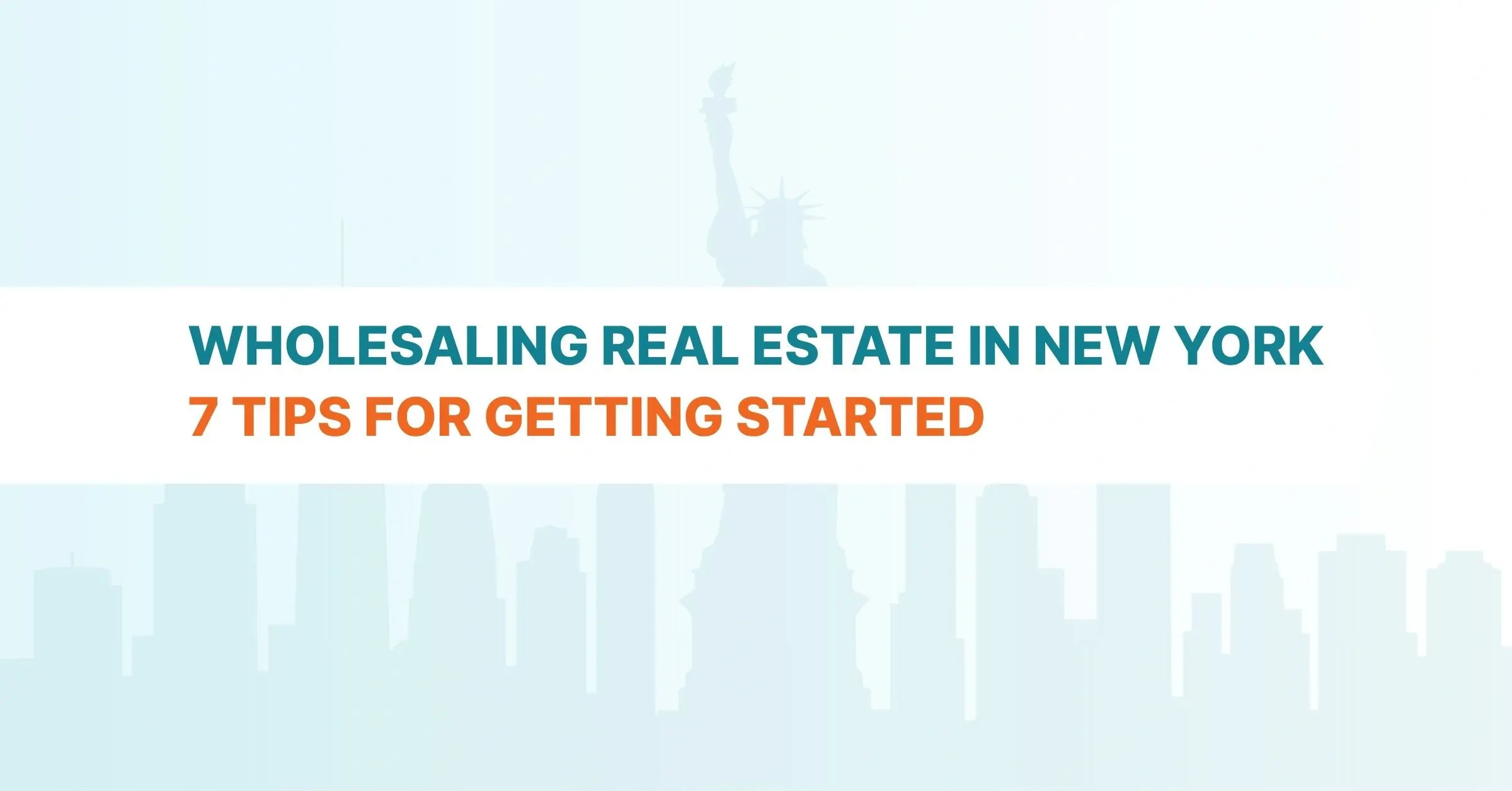Disclaimer: PropStream does not offer legal advice. Before attempting a wholesale deal, we highly recommend educating yourself on the practice’s legality in your region and consulting a legal professional.
Wholesaling can be a great way to start investing in real estate with little cash, but you must understand wholesale real estate contracts before you try it. This article will cover what a wholesale contract is, how it works, and what it should include.
Table of Contents |
What Is a Wholesale Contract and How Does It Work?

Wholesale contracts have two parts: a purchase agreement and an assignment contract. You must first understand the wholesaling process to understand how they work together.
In real estate, a wholesaler puts a property under contract and then sells the contract to an interested party, typically another investor.
First, the wholesaler enters an agreement with the seller for the exclusive right to purchase the property, aka the purchase agreement. Then, the wholesaler looks for interested investors whom they can “assign” the purchase agreement to for a fee via an assignment contract. From there, the wholesaler’s job is done, and the investor completes the final property transaction with the seller directly.
That’s the basic mechanics of wholesaling. Next, we’ll review what a wholesale contract's two parts should include.
Keep in mind that wholesaling laws vary by state, so it’s best to consult a local real estate attorney about what to include in a wholesaling contract in your region.
Part #1: Wholesale Real Estate Purchase Agreement
A wholesale real estate purchase agreement is the initial contract between the wholesaler and the seller. It outlines the details of the transaction, conditions that must be met for the sale to take place, and contingencies for backing out or altering the deal.
Basic Details
Every wholesale purchase agreement should include these basic details:
- Parties involved. List the parties involved in the agreement, i.e., you as the wholesaler and the property owner as the seller.
- Property description. Provide the property address, type, size, and a thorough description of its features (number of bedrooms, bathrooms, etc.) and condition (damages and needed repairs).
- Deed type. Specify the deed type that comes with the property (e.g., a warranty, quitclaim, or fiduciary deed).
- Purchase price. State the agreed-upon purchase price for the end buyer and any financing details (e.g., seller financing options).
- Closing date. Establish the date on which the transaction will be completed.
Contingencies, Clauses, and Addenda
A wholesale contract should also include contingencies and clauses to protect the buyer and seller from uncertainties. Here are some examples:
- Inspection contingency. This lets the buyer renegotiate or back out of the deal if a home inspection reveals the property’s condition isn’t as described.
- Financing contingency. This excuses the buyer from completing the deal if they are unable to secure financing.
- Insurance contingency. This protects the buyer if the property is deemed uninsurable (e.g., due to major structural issues or unpermitted renovations).
- Marketable title option. This lets the buyer terminate the contract if the seller can’t deliver a clear title.
- Earnest money clause. This details any earnest money requirements for the wholesaler and later buyer: the deposit amount, where it will be held, under what conditions it will be refunded, etc.
- Risk of loss and damage. This prevents the buyer from liability for property damage while under contract.
- Assignment clause. This grants the wholesaler the right to assign the purchase agreement to another buyer (an essential part of a wholesale agreement).
- Marketing period. This stipulates how long the wholesaler has to find an investor to assume the purchase agreement before the contract becomes void.
- Adjustment clauses. These set the terms for adjusting various aspects of the deal (e.g., the price or closing date) in the event of unpredictable circumstances (e.g., a natural disaster or law change).
- Default clauses. These detail the course of action if either party breaks their end of the agreement.
- Addenda. These are additional documents that help clarify the purchase agreement (e.g., details on closing costs or information for lenders)
Many other wholesale contract clauses exist, but these are the most common.
Keep in mind that the wholesale purchase agreement doesn’t represent a sale but an “equitable conversion.” This means the wholesaler (or buyer) has an equitable interest in the property with certain rights and responsibilities, but the actual property title remains with the seller until the sale is complete.
Part #2: Wholesale Real Estate Assignment Contract

Once you secure a purchase agreement, the next step is to enter an assignment contract with an investor. It outlines the transfer of the purchase agreement from you to them and should include the following:
- Parties involved. Name the parties involved, i.e., you as the wholesaler (assignor) and the investor or buyer (assignee).
- Original purchase agreement. Attach the original purchase agreement with all the sale details, including purchase price, property description, terms, etc.
- Transfer of rights. Explicitly state that you assign all of the rights and obligations of the original purchase agreement to the assignee.
- Assignment fee. State your price for transferring the purchase agreement and the transaction terms. For example, you may require a deposit upfront and collect the rest of the fee after closing.
- Assignment date. Specify when the assignment transfer will be effective.
- Seller’s consent. If the original purchase contract requires the seller to approve the assignment, add a provision stating that you will seek their consent.
- Expiration date. Include a date by which the assignee must accept the contract before it becomes void.
- Other contingencies. Add any other contingencies that would allow you or the assignee to alter or back out of the agreement.
Once you and the buyer sign the contract, it’s legally binding, and your work is done.
Additional Tips for Crafting a Rock-Solid Wholesale Contract
Here are some final tips for creating a robust wholesale contract:
Take a wholesaling course. Even though wholesalers don’t need to be licensed in most states, educating yourself on best wholesaling practices is still a good idea. Sign up for PropStream Academy’s free Introduction to Wholesaling course today!
Start with contract templates. Why create a purchase agreement or assignment contract from scratch when you can start with a template? Find a free one online and customize it to your specific deal to save time and effort.
Research local wholesaling laws. Each state has its own regulations regarding wholesaling licensing requirements, advertising regulations, assignment clauses, and more. Do your due diligence to ensure your deal is compliant.
Consult a real estate attorney. They can review your wholesale contract to ensure it is legally sound, protects your interests, and meets local requirements.
Try PropStream for 7 Days Free!
Ready to land your next wholesale deal? PropStream can help with both sides of the deal. It can help you identify distressed properties with motivated sellers and find potential investors to assign your contracts to.
| Sign up for a free 7-day trial today and get 50 leads on us! |


